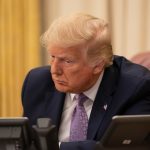The upcoming debate between Donald Trump and Kamala Harris is set to shine a light on a topic that has been at the forefront of economic discourse—tariffs. Yes, the very same tariffs that critics have been howling about since Trump took office, claiming they would turn America into a trade war zone. Critics, both from the left and some from the right, were quick to cling to their doom-and-gloom predictions, but it seems they didn’t reckon with a little something called the “lamp of experience.”
Initially, when Trump brought tariffs into the mix, many claimed he’d set off a chain reaction that would at best result in higher prices for consumers and at worst bring the U.S. economy to its knees. Given it had been so long since the U.S. employed a robust trade strategy, the anti-tariff crowd’s predictions carried a whiff of plausibility. However, much like a magician pulling a rabbit from a hat, the reality of tariffs has shown that the skeptics may have jumped the gun, making bold claims with little substantial evidence.
Breitbart Business Digest: How Trump Should Fight Back Against Harris on Tariffs https://t.co/UzyYZssqER via @BreitbartNews
— Socrates1951 (@socrates1951) September 10, 2024
What’s worth noting is that sound economic theory backs up Trump’s stance on tariffs. Contrary to popular belief, tariffs often don’t burden consumers with higher prices. In fact, when a large economy like the U.S. imposes tariffs, it can lead to reduced foreign prices as exporting countries scramble to adapt. The idea isn’t just fanciful economics; it’s a principle that goes back to the Metzler Paradox, which asserts that tariffs can actually lower domestic prices on imported goods due to increased competition. Those who wave their hands in distress over the fallout of tariffs might want to brush up on their economic theory.
One of the more amusing aspects of the critics’ response to tariffs is the glaring political bias that comes into play. Many economists, who tend to lean left, appear to take their cues from the overarching narrative—if it’s Trump’s idea, it must be bad. Their reluctance to admit any potential benefits of tariffs could be chalked up to a fundamental desire to remain in their comfort zone of prestige and social standing within their circles. Interestingly, since Joe Biden has taken office and maintained many of Trump’s tariffs, the clamor has diminished considerably, suggesting that it was less about the actual economic impacts and more about the political affiliation of the man in charge.
The empirical evidence continues to make the case for Trump and the tariffs he championed. Prices for durable goods surprisingly fell by 2.1 percent from the beginning of Trump’s presidency to the onset of the pandemic. Even with the pandemic-induced price increases, the total rise in durable goods was a mere 1.3 percent over four years. For those who love to flourish wild claims about how tariffs would break the bank, those numbers are a pinch of cold water on their narrative. Indeed, most analyses reveal that the expected consumer price increases are laughably overstated, with many companies absorbing costs rather than passing them on.
As the debate draws near, Trump can confidently counter claims from Harris or the moderators that tariffs are simply a tax on consumers. With a record that shows little pass-through to retail prices, he can invoke his past experience and anchor his arguments in the tangible results he achieved during his presidency. After all, when looking to the future, it’s wise to heed the voices of the past, especially those that echo the wisdom of founding figures like Patrick Henry, who knew that true guidance comes from real-world experience, not speculative worries.




